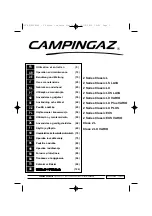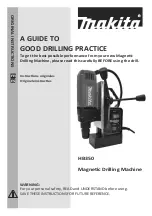
GB
- 16 -
stop (7).
•
Set the depth stop (7) to the same level as
the drill bit.
•
Pull the depth stop (7) back by the required
drilling depth.
•
Retighten the locking screw (a).
•
Now drill the hole until the depth stop (7) tou-
ches the workpiece.
5.3. Tool insertion (Fig. 4)
•
Clean the tool before insertion and apply a
thin coating of drill bit grease to the shaft of
the tool.
•
Pull back and hold the locking sleeve (2).
•
Insert the dust-free tool into the tool mounting
as far as it will go whilst turning it. The tool will
lock itself.
•
Check that it is properly secure by pulling the
tool.
5.4 Tool removal (Fig. 5)
Pull back and hold the locking sleeve (2) and re-
move the tool.
5.5 Dust collection device (Fig. 6)
Slide the dust collection device (a) over the drill
bit before carrying out any hammer drilling verti-
cally above your head.
6. Operation
Danger
To prevent all danger, the machine must only be
held using the two handles (6/8). Otherwise there
may be a risk of su
ff
ering an electric shock if you
drill into cables.
6.1 Switching On and O
ff
(Fig. 1)
To switch on: Press and hold the operating switch
(4).
To switch o
ff
: Let go of the operating switch (4)
6.2 Hammer stop facility (Fig. 7)
The hammer drill has a hammer stop facility for
gentle initial drilling.
•
Turn the rotary switch for the hammer stop
facility (5) to position (B) to switch off the
hammer facility.
•
To switch on the hammer facility again the
rotary switch for the hammer stop facility (5)
must be turned back to position (A).
6.3 Rotation stop facility (Fig. 8)
•
For hammer drilling, press the button (E) on
the rotary switch (3) and simultaneously turn
the rotary switch (3) to position A.
•
For chiseling, press the button (E) on the rota-
ry switch (3) and simultaneously turn the rota-
ry switch (3) to position B. In switch position B
the chisel is not locked.
•
For chiseling, press the button (E) on the
rotary switch (3) and simultaneously turn the
rotary switch (3) to position C. The chisel is
locked in position C.
Important.
Please note that it is not possible to operate the
hammer drill with the hammer stop and rotation
stop facilities both active at the same time.
Notice
Only low pressure is required for hammer drilling.
Excessive pressure will exert an unnecessary
force on the motor. Check the drill bits at regular
intervals. Sharpen or replace blunt drill bits.
7. Replacing the power cable
Danger!
If the power cable for this equipment is damaged,
it must be replaced by a special power cable
which is available from the manufacturer or its
after-sales service.
8. Cleaning, maintenance and
ordering of spare parts
Danger!
Always pull out the mains power plug before star-
ting any cleaning work.
8.1 Cleaning
•
Keep all safety devices, air vents and the
motor housing free of dirt and dust as far as
possible. Wipe the equipment with a clean
cloth or blow it with compressed air at low
pressure.
•
We recommend that you clean the device
immediately each time you have finished
using it.
•
Clean the equipment regularly with a moist
cloth and some soft soap. Do not use
cleaning agents or solvents; these could at-
tack the plastic parts of the equipment. Ensu-
Anl_TC_RH_1600_SPK9.indb 16
Anl_TC_RH_1600_SPK9.indb 16
15.10.2019 11:10:42
15.10.2019 11:10:42
















































